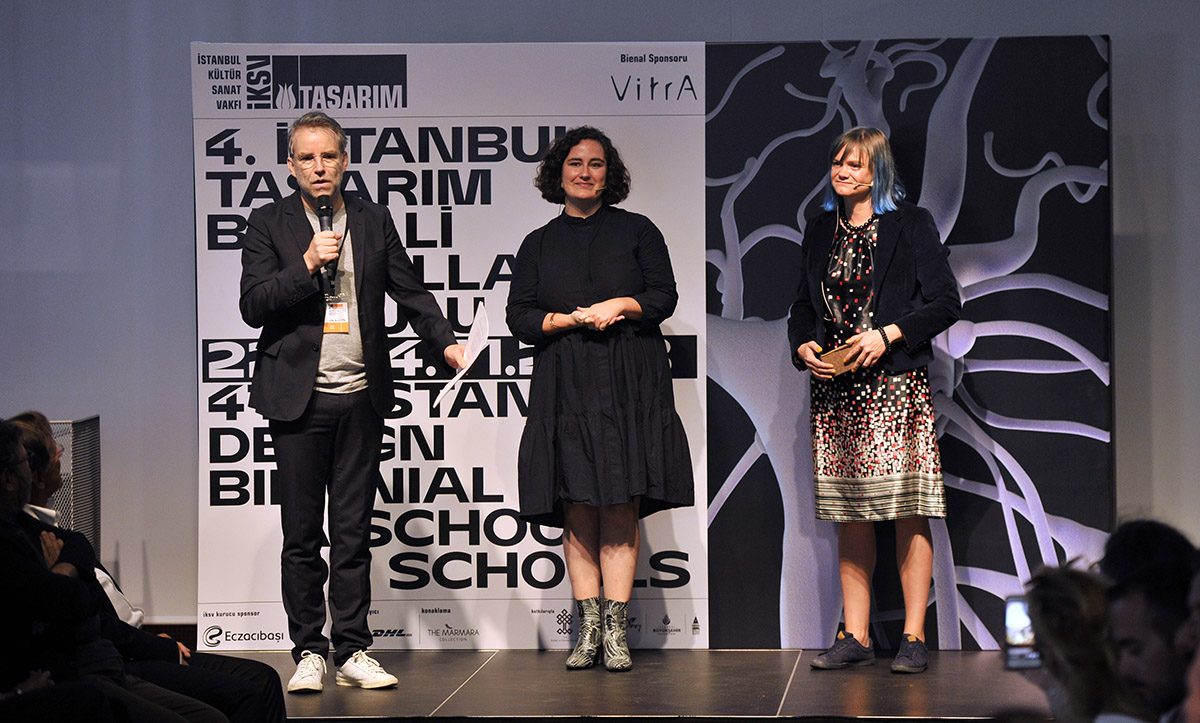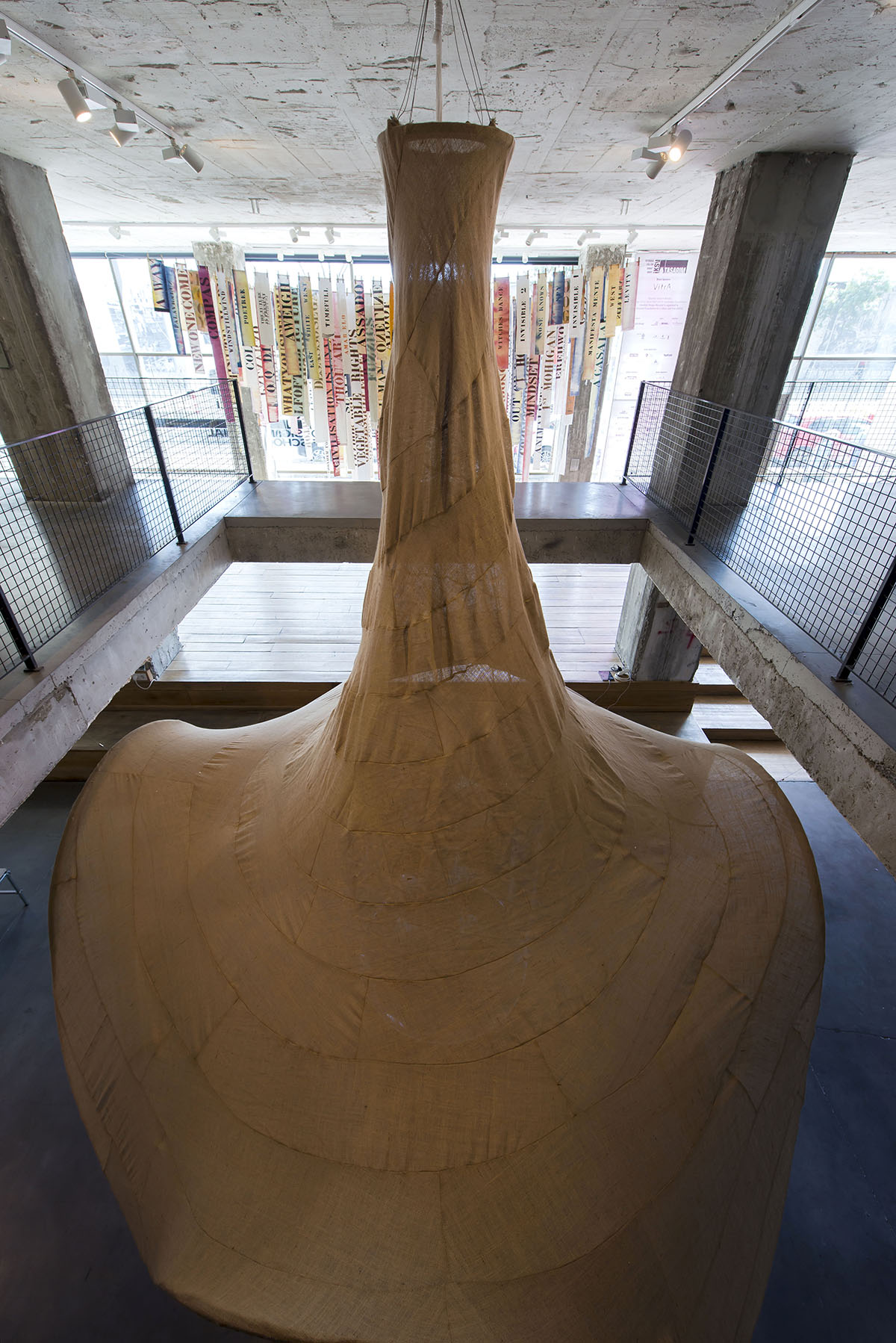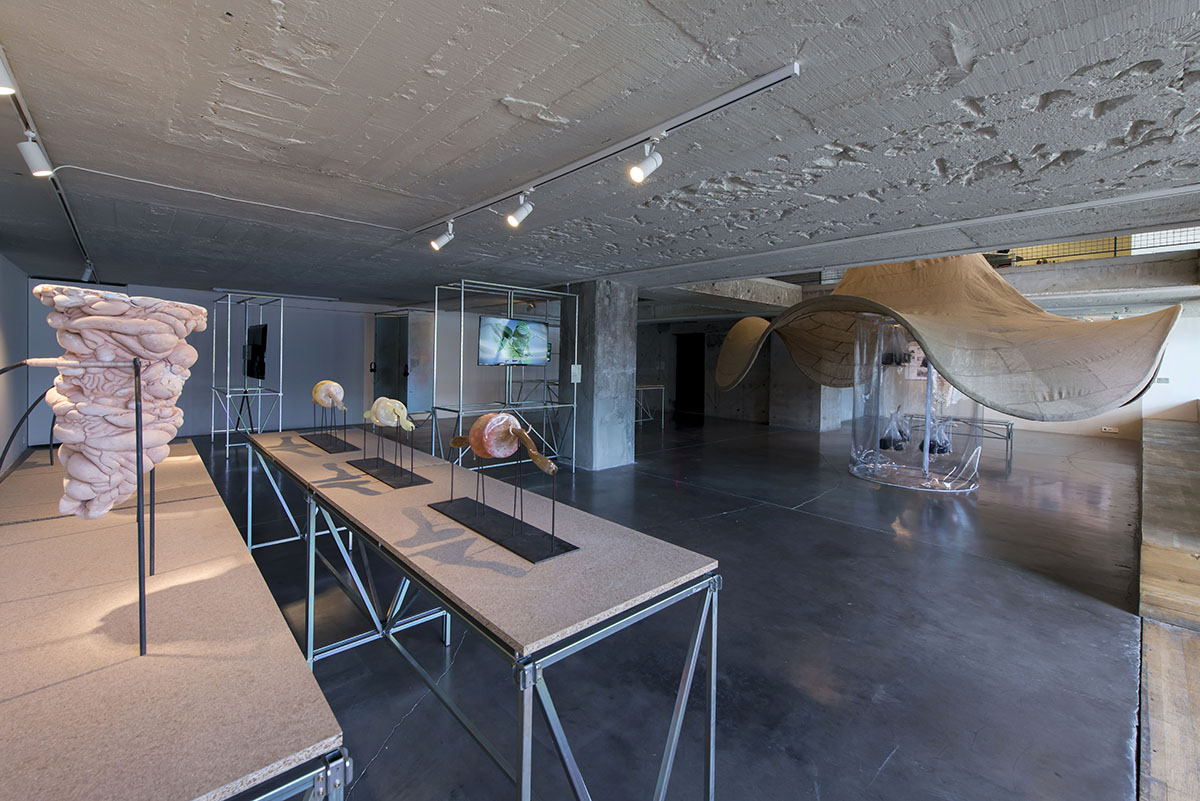Submitted by Berrin Chatzi Chousein
"Biennial criticizes our current situation, by speculating and creating doubt" says Jan Boelen
Turkey Architecture News - Oct 09, 2018 - 23:46 7927 views

"We are not suggesting an alternative educational model, but by critiquing our current situation, by speculating and creating doubt,we can create an environment in which we can rethink the design field and design education," says Jan Boelen, curator of the 4th Istanbul Design Biennial - which runs from September 22, 2018 to November 4, 2018 in the Beyoğlu District of Istanbul, Turkey.
"We are not actively defending or promoting a single design education format or educational system. Rather, we want the biennial to be a place where multiple ideas are shared," Boelen told World Architecture Community in an exclusive interview.
This year, the 4th Istanbul Design Biennial is themed as "A School of Schools", interrogating design education in multiple layers where many educational strategies, variety of learning formats and alternative methods have been tested and shared in the fast exchange of knowledge.
Jan Boelen and Associate curators Vera Sacchetti and Nadine Botha don't focus on a concrete response, a specific learning format, or refine the syllabus in the Biennial, rather than that, they want to showcase some process-based discoveries and new experimental models in design education in which the nature of "learning mechanics" is requestioned and criticized.

Jan Boelen, Vera Sacchetti and Nadine Botha. Image © Ilgın Erarslan Yanmaz
The exhibition, described as "a new educational platform", is manifested and showcased in variety of formats at six different venues of the city’s most iconic cultural institutions, with different sub-themes: Yapı Kredi Culture Centre - Currents School, Pera Museum - Scales School, Arter - Earth School, SALT Galata - Time School, Studio-X Istanbul - Digestion School and Akbank Sanat - Unmaking School.
"As curators of the biennial, we do not intend to replace design education or to refine the syllabus; rather, we want to facilitate the creation of new knowledge, to search for alternatives to established systems and, crucially, to create a space of exception where new ideas can be freely shared," added Boelen.
"We aim to create spaces of exception, which have been a consistent aspect of alternative design education initiatives throughout history, from the Bauhaus to Black Mountain College, and from Global Tools to the Sigma Group.

Palaver+Palaver by Mae-ling Lokko, Nana Ofori-Atta Ayim and Selassie Ataditka at Studio-X
Organised by the Istanbul Foundation for Culture and Arts (IKSV), the biennial brings together projects from more than 200 interdisciplinary practitioners from across the globe. This year, the 4th Istanbul Design Biennial will seek to consolidate the legacies of previous editions, and reinvent the biennial format into a productive process-orientated platform for researching, experimenting and learning.
Speaking about the Bauhaus model and its impacts on design education, Boelen said "since the Bauhaus model emerged, the world has changed greatly, and so has the design discipline. What we observe is that design education is not following these new developments."
"The field of design has expanded, beyond a product-centred field and into other directions – critical, speculative, relational – and these new directions should be incorporated into design education."
"However, we are not suggesting an alternative educational model, but by critiquing our current situation, by speculating and creating doubt,we can create an environment in which we can rethink the design field and design education."

Judith Seng's Acting Things VII–School Of Fluid Measures at Pera Museum
Boelen, 50, is currently the founder and artistic director of Z33 House for Contemporary Art in Belgium, artistic director of experimental laboratory Atelier LUMA in France, and head of the Social Design masters programme at Design Academy Eindhoven in the Netherlands.
His appointment was made by an advisory board that includes Design Museum chief curator Justin McGuirk, Dresden Museum of Decorative Arts director and e-flux editor Nikolaus Hirsch. The event has previously been overseen by curators including Joseph Grima, Zoë Ryan, and Beatriz Colomina and Mark Wigley.
Boelen also serves on various boards and committees including the advisory board of the V&A Museum of Design Dundee in the UK and Creative Industries Fund in the Netherlands. Boelen holds a degree in product design from the Media and Design Academy (now the LUCA School of Arts) in Genk, Belgium.
Read the full transcript of our interview with Jan Boelen below:
Berrin Chatzi Chousein: Could you please tell us more about the theme of the 4th Istanbul Design Biennial? Why did you choose this topic?
Jan Boelen: Organised by the Istanbul Foundation for Culture and Arts (IKSV), the 2018 Istanbul Design Biennial – A School of Schools focuses on design, education, and design education. Our interest in this area stemmed from the realisation that design education has barely changed since the founding of the Bauhaus almost 100 years ago. As we approach the centenary in 2019, we decided that it was time to address this. The Bauhaus philosophy and methodology continues to inform the design discipline in a number of ways, despite the fact that the world is a radically different place. As a result, there is no synchrony between the design discipline, design education, and the modern world at large.
As curators of the biennial, we do not intend to replace design education or to refine the syllabus; rather, we want to facilitate the creation of new knowledge, to search for alternatives to established systems and, crucially, to create a space of exception where new ideas can be freely shared.Here, designers, architects and multidisciplinary practitioners can doubt, speculate and question universal global systems. Here, design can learn from itself through the exchange of knowledge.
Berrin Chatzi Chousein: What do you aim to discuss with “A School of Schools” on a global scale?
Jan Boelen: A School of Schools aims to start a discussion on design education at a global scale, and with an awareness of what characterises our present times. The present is at best a peculiar and at worst a terrifying transition period where old forces keep trying to reinvent the same traditional system of material abundance and information scarcity. This despite the undeniable evidence of planetary strain as material resources are plundered, and our every human system from domestic routine to high speed trading run by the insatiable leviathan of information that is the internet.
With more information than ever and more schooling than ever, the world and its leaders have completely run out of ideas to deal with the complexities that this inversion of logic introduces. New proposals are needed for how to organise society, how to structure our governments, how to live with not against the planet, how to sift fact from fiction, how to relate to each other, and frankly, how to simply survive. Sitting passively in class or on sofas at home expecting teachers and leaders produced by the same debilitating education system to produce the answers is simply no longer an option.
Berrin Chatzi Chousein: Did you search for educational models in Turkey? What were your first impressions in Turkey as a major source of the Biennial?
Jan Boelen: I made several trips to Istanbul while formulating the concept for School of Schools, and also did an extensive research trip throughout the rest of Turkey to understand the situation better. My first impressions were twofold: firstly, that thinking about education is important for Turkey, especially the new platforms and unconventional alternatives presented at the biennial.
Secondly, I observed that there is a real hunger to collaborate with the rest of the world, particularly in Istanbul, a global city that is currently feeling isolated. Therefore, we aimed to create a space for encounters and exchanges of knowledge to happen. Spaces of learning create opportunities for people from all backgrounds to connect, where ideas can be shared and knowledge can be accumulated.

Genetically Modified Generation (Designer Babies) by Pınar Yoldaş at Pera Museum
Berrin Chatzi Chousein: As today’s educational systems are enhanced by different models of taxonomies, curriculums, spatial varieties, or different learning patterns worldwide, is there a general educational/learning format that the Biennial defends? Or, in fact, on the contrary, is it trying to debate an educational system over "physical informality" in design?
Jan Boelen: We are not actively defending or promoting a single design education format or educational system.Rather, we want the biennial to be a place where multiple ideas are shared.We aim to create spaces of exception, which have been a consistent aspect of alternative design education initiatives throughout history, from the Bauhaus to Black Mountain College, and from Global Tools to the Sigma Group. These initiatives have not only helped design to evolve, challenge itself and push its own boundaries, but also that of education and learning in general.
Beyond the design discipline, some of these initiatives have also experimented with alternative ways of living, working, and connecting with one another. Through this process-based experiential research, new manifestations, meanings and implications of design can emerge.
Berrin Chatzi Chousein: Do you really see a problem in design education in the general sense? And if yes, from your point of view, what kinds of alternative models can be suggested?
Jan Boelen: Since the Bauhaus model emerged, the world has changed greatly, and so has the design discipline. What we observe is that design education is not following these new developments. The field of design has expanded, beyond a product-centred field and into other directions – critical, speculative, relational – and these new directions should be incorporated into design education.However, we are not suggesting an alternative educational model, but by critiquing our current situation, by speculating and creating doubt,we can create an environment in which we can rethink the design field and design education.
Berrin Chatzi Chousein: What kind of a physical narrative (static/interactive/playful/didactic…etc) do you present for the audience in six different venues?
Jan Boelen: The six ‘schools’ – Time School, Scales School, Currents School, Digestion School, Earth School and Unmaking School – were determined following our open call, which had more than 700 entries from all over the world. Their themes were developed both from the projects received through the open call, and from local research in Istanbul. We envision them as six different ‘classrooms’, connected and interacting with the streets of Istanbul as ‘corridors’.
The host venues are six of the city’s most important cultural institutions in Beyoglu: SALT Galata, Arter, Pera Museum, Akbank Sanat, Yapı Kredi Culture Centre and Studio-X Istanbul. We believe that a biennial must create strong local connections in order to have a lasting legacy. When staging a biennial about learning, we ourselves must learn from the local context, make new connections and reinforce existing networks. In other words, the biennial must create a true dialogue with the city and its inhabitants.

A shot from the exhibition "Digestion School" at Studio-X
Berrin Chatzi Chousein: What are the impacts of digital technologies, new production systems, open sourcefulness, collective production or digital culture in the 21stcentury design education?
Jan Boelen: These new tools and techniques have entered the curriculum, but only as an add-on, and not as a fundamentally disruptive addition. In the end, they are still tools and techniques, much like silkscreening or typesetting before them. They open many doors in their own right. But if the educational system is not questioned, they alone won’t change it.
Berrin Chatzi Chousein: One of the themes of the Biennial at Arter is "Earth School". We have started to see new flexible, moveable teaching models, or maybe we should call it "floating universities" in different cities. Could you please elaborate this term in a broad sense, what do you mean by Earth School?
Jan Boelen: Earth School presents a diversity of projects questioning and subverting the prioritisation of capitalist growth over the planet’s natural resources to suggest an alternative – less fatalistic – future. The projects featured in Earth School draw on various project-based learning strategies – from co-creation and institutional collaborations to artistic research, data analysis, critical making, and manual- and machine-making – but all have one thing in common: they recognise the importance of questioning and subverting the prioritisation of capitalist growth over the planet’s resources and rhythms, and who determines global priorities. An active learning space in the exhibition provides opportunities to reconceive fatalist trajectories.
"A total denouncement of fatalism is necessary. We are transformative beings and not beings for accommodation," wrote Brazilian educator Paulo Freire in Pedagogy of the Oppressed, this year celebrating its 50th anniversary. This seminal text first identified how schools treat students as empty vessels in which knowledge is deposited, like coins in a bank, by teachers. Schooling assumes that teachers know everything, prevents students from knowing more than teachers, and stifles the potential for generating new ideas and new knowledge. Earth School prompts us to doubt what we consider inevitable about geopolitics, abundance and scarcity, and the future.

Hope On Water by SO? and collaborators at Arter
Berrin Chatzi Chousein: One of the most painful aspects of education systems is the financial outcomes or models in terms of “learners” perspective. Does the Biennial discuss this issue in any theme or general?
Jan Boelen: By questioning the educational system in design, we also question its financial aspects. It is today assumed that a higher education in design comes with a hefty price tag, and this is considered an ‘investment’. But an investment in what exactly? The system is predicated on producing efficient and obedient workers, and issuing qualifications as access- and status-control. Neoliberalism has perverted this self-fulfilling institution to the point where students, given the illusion of agency by being framed as customers, are often staking a lifetime of projected earnings in debt simply to afford the education that qualifies them for a lifetime of drudgery. Yet increasingly, the reality is that less and less of the jobs that children are currently schooling for will still exist by the time they graduate, and that the gap between increased qualifications and projected income has been widening dramatically since the 1980s advent of computers. Parents and young adults banking on the previously failsafe investment of expensive education have no guarantee of returns.
Nevertheless, the biennial does not offer a clear answer to this issue. We’re not here to optimise the system without questioning the mechanics of the system. Rather than offering solutions to predetermined questions, A School of Schools intends to inspire doubt – not knowing is the first step in learning, and studying for unknown outcomes initiates the potential for newness. We would like to start a discussion on design, education and design education. We would like it to generate more questions than answers. This places the responsibility on each of us to become agents of our own education.
World Architecture Community is Magazine Sponsor of the Biennial. See WAC's previous coverages here.
Top image © Veerle Frissen
All images © Kayhan Kaygusuz, courtesy of Istanbul Design Biennial, unless otherwise stated.
